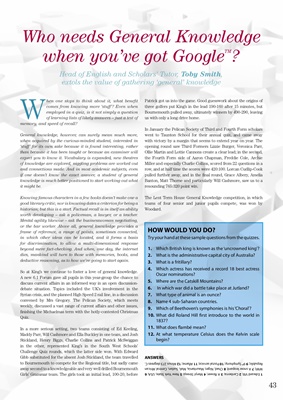
When one stops to think about it, what benefit
comes from knowing more 'stuff'? Even when
employed in a quiz, is it not simply a question
of learning lists of likely answers - just a test of
memory, and speed of recall?
General knowledge, however, can surely mean much more,
when acquired by the curious-minded student, interested in
'stuff' for its own sake because it is found interesting, rather
than because it has been taught or because an examiner will
expect you to know it. Vocabulary is expanded, new theatres
of knowledge are explored, niggling problems are worked out
and connections made. And in most academic subjects, even
if one doesn't know the exact answer, a student of general
knowledge is much better positioned to start working out what
it might be.
Knowing famous characters in a few books doesn't make one a
good literary critic, nor is knowing dates a criterion for being a
historian; but this is a start. Factual recall is in itself an ability
worth developing - ask a policeman, a lawyer, or a teacher.
Mental agility likewise - ask the businesswoman negotiating,
or the bar worker. Above all, general knowledge provides a
frame of reference, a range of points, sometimes connected,
in which other ideas can be located, and it forms a basis
for discrimination, to allow a multi-dimensional response
beyond mere fact-checking. And when, one day, the internet
dies, mankind will turn to those with memories, books, and
deductive reasoning, as to how we're going to start again.
So at King's we continue to foster a love of general knowledge.
A new 6.1 Forum gave all pupils in this year-group the chance to
discuss current affairs in an informed way in an open discussiondebate situation.
Topics included the UK's involvement in the
Syrian crisis, and the planned High Speed 2 rail line, in a discussion
convened by Mrs Gregory. The Pelican Society, which meets
weekly, discussed a vast range of current affairs and other issues,
finishing the Michaelmas term with the hotly-contested Christmas
Quiz.
In a more serious setting, two teams consisting of Ed Keeling,
Maddy Parr, Will Cashmore and Ella Buckley in one team, and Josh
Stickland, Henry Biggs, Charlie Collins and Patrick McSwiggan
in the other, represented King's in the South West Schools'
Challenge Quiz rounds, which the latter side won. With Edward
Gibb substituted for the absent Josh Stickland, the team travelled
to Bournemouth to compete for the Regional title, but sadly came
away second to a knowledgeable and very well drilled Bournemouth
Girls' Grammar team. The girls took an initial lead, 100-20, before
Patrick got us into the game. Good guesswork about the origins of
three golfers put King's in the lead 190-160 after 15 minutes, but
Bournemouth pulled away, ultimately winners by 490-290, leaving
us with only a long drive home.
In January the Pelican Society of Third and Fourth Form scholars
went to Taunton School for their annual quiz, and came away
with victory by a margin that seems to extend year on year. The
opening round saw Third Formers Lizzie Burger, Veronica Parr,
Ollie Martin and Lottie Cannons create a clear lead; in the second,
the Fourth Form side of Aaron Chapman, Freddie Cole, Archie
Miller and especially Charlie Collins, scored from 22 questions in a
row, and at half time the scores were 420:100. Lorcan Cudlip-Cook
pulled further away, and in the final round, Grace Albery, Amelia
Banton, Matt Thorne and particularly Will Cashmore, saw us to a
resounding 765:320 point win.
The Lent Term House General Knowledge competition, in which
teams of four senior and junior pupils compete, was won by
Woodard.
Who needs General Knowledge
when you've got Google
TM
?
Head of English and Scholars' Tutor, Toby Smith,
extols the value of gathering 'general' knowledge
HOW WOULD YOU DO?
Try your hand at these sample questions from the quizzes.
1. Which British king is known as the 'uncrowned king'?
2. What is the administrative capital city of Australia?
3. What is a fritillary?
4. Which actress has received a record 18 best actress
Oscar nominations?
5. Where are the Catskill Mountains?
6. In which war did a battle take place at Jutland?
7. What type of animal is an ounce?
8. Name 4 sub-Saharan countries.
9. Which of Beethoven's symphonies is his 'Choral'?
10. What did Roland Hill irst introduce to the world in
1837?
11. What does lambé mean?
12. At what temperature Celsius does the Kelvin scale
begin?
1 Edward VIII; 2 Canberra; 3 A lower; 4 Meryl Streep; 5 New York State, USA; 6
WWI; 7 A snow leopard; 8 Chad, Niger, Mauritania, Mali, Sudan, Central African
Republic; 9 9th Symphony; 10 Postal service; 11 Alame; 12 Minus 273 degrees C.
ANSWERS
43